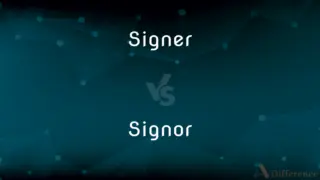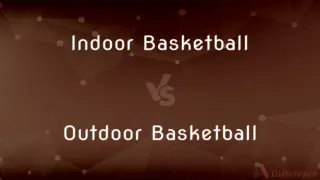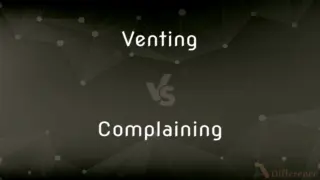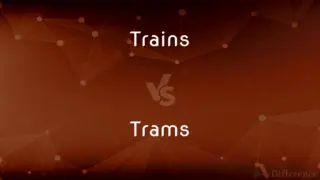Plebs vs. Plebe — What's the Difference?
By Tayyaba Rehman & Fiza Rafique — Updated on March 19, 2024
Plebs often refers to the general body of free Roman citizens not belonging to the patrician class, while Plebe is a shortened form used mainly in modern contexts, especially in military or educational settings.

Difference Between Plebs and Plebe
Table of Contents
ADVERTISEMENT
Key Differences
Plebs were the common people of ancient Rome, distinguished from the elite patricians, whereas Plebe is more commonly used in contemporary settings, such as military academies, to refer to newcomers or lower-ranking individuals. Both terms have their roots in Roman history, but their usage has evolved over time. While plebs were a social class, the term plebe has been adapted to denote a more specific group within a hierarchy, often in a somewhat derogatory sense.
In ancient Rome, plebs represented a significant portion of the population and had their own assemblies and representatives, while the term Plebe, as used today, usually refers to individuals at the bottom of an institutional hierarchy. This difference highlights the shift from a broad social class to a more specific group within a structure.
Plebs had a complex relationship with the patrician class, characterized by social and political struggles, known as the Conflict of the Orders, whereas plebes, in modern contexts, often undergo a period of initiation or adjustment, marked by challenges designed to integrate them into the existing order.
The rights and privileges of plebs evolved over time, leading to greater political equality with patricians, while the role of plebes in institutions like military academies or universities often remains fixed, with clear paths to shed their initial status through performance and time.
Comparison Chart
Origin
Ancient Rome
Derived from "Plebs," used in modern contexts
ADVERTISEMENT
Classification
Social class
Status within an organization
Context
Historical, broad social group
Military, educational, specific groups
Role
Commoners, non-patricians
Newcomers, lower-ranking individuals
Evolution
Gained rights over time
Status often temporary, changes with time or achievement
Compare with Definitions
Plebs
Members of the general citizenry in ancient Rome, excluding the aristocracy.
The plebs often clashed with the patricians over political rights.
Plebe
A freshman, especially at a military academy.
The plebes underwent rigorous training in their first year.
Plebs
Common people, especially when considered as less educated or refined.
The playwright's work appealed not just to the elite but also to the plebs.
Plebe
In modern usage, refers to a person at the lowest rank.
The plebes at the academy looked up to the upperclassmen.
Plebs
The collective term for ordinary people without noble rank.
The demands of the plebs led to significant changes in Roman law.
Plebe
A beginner or novice in a particular area.
Even though he was a plebe in chess, he showed great potential.
Plebs
In historical contexts, refers to non-privileged classes.
The plebs were instrumental in shaping Roman political reforms.
Plebe
A term used to describe a newcomer in a somewhat derogatory way.
The older members sometimes unfairly treated the plebes.
Plebs
A derogatory term for people perceived as lower in status.
The senator dismissed his critics as nothing more than uninformed plebs.
Plebe
Someone new to an organization or field, often viewed as inferior.
As a plebe, he had to perform all the menial tasks.
Plebs
The common people of ancient Rome
The plebs and the patricians.
Plebe
A first-year student at the US Military Academy or the US Naval Academy.
Plebs
The common people; the populace.
Plebe
A plebeian, a member of the lower class of Roman citizens.
Plebs
Plural of pleb
Plebe
The plebs, the plebeian class.
Plebs
The plebeian class of Ancient Rome.
Plebe
(obsolete) The similar lower class of any area.
Plebs
The common people, especially (pejorative) the mob.
Plebe
A freshman cadet at a military academy.
Plebs
The commonalty of ancient Rome who were citizens without the usual political rights; the plebeians; - distinguished from the patricians.
Plebe
The common people; the mob.
The plebe with thirst and fury prest.
Plebs
Hence, the common people; the populace; - construed as a pl.
Plebe
A member of the lowest class in the military academy at West Point; also, a freshman at any military or naval academy.
Plebe
A military trainee (as at a military academy)
Common Curiosities
How did plebs differ from patricians in ancient Rome?
Plebs were the common people without noble lineage, while patricians were members of the ruling class with ancestral privileges.
Can "plebe" be used interchangeably with "plebs"?
While both terms originate from the same root, "plebe" is more commonly used in modern contexts to refer to individuals in specific hierarchical settings, making them not fully interchangeable.
What is the historical significance of plebs in Rome?
Plebs were central to Rome's social structure, engaging in the Conflict of the Orders, which led to significant political reforms and greater rights.
How does the term "plebeian" relate to "plebs" and "plebe"?
"Plebeian" is an adjective relating to plebs, denoting something of or belonging to the common people, whereas "plebe" is a more modern term with a narrower usage.
In what settings is the term "plebe" most commonly used today?
"Plebe" is predominantly used in military academies like West Point or the Naval Academy in the US, and also in some educational institutions to describe first-year students.
How has the perception of plebs changed over time?
The perception of plebs has evolved from a specific social class in ancient Rome to a broader reference to common people or the working class in various historical and modern contexts.
Is "plebe" a derogatory term?
It can be, depending on the context. In military or educational settings, it may be used in a more neutral way to denote newcomers.
How do plebs and plebes relate to modern society?
The concept of plebs can relate to discussions on social class and inequality, while "plebe" might be used more colloquially to describe someone new or of lower status within a group.
What kind of reforms resulted from the plebs' struggles in Rome?
The Conflict of the Orders led to reforms such as the Laws of the Twelve Tables, the creation of the office of the Tribune of the Plebs, and eventually, plebs gaining the right to hold almost all state offices.
How did plebs contribute to the military in ancient Rome?
Initially, plebs served in the Roman army in lower ranks, but over time, as their rights expanded, they could hold higher positions and were crucial to Rome's military campaigns.
Can someone outside of a military or educational context be called a plebe?
While less common, the term can be used colloquially to refer to someone who is new to any particular field or activity, often with a slightly derogatory connotation.
What roles did plebs play in ancient Roman society?
Plebs were involved in various professions and trades, contributing significantly to Rome's economy and serving in the military, although they initially had limited political rights.
Are there modern equivalents to the social dynamics between plebs and patricians?
Modern societies often have their own versions of social stratification, though not as formally defined, where disparities between different social or economic classes can mirror the historical dynamics between plebs and patricians.
Is there a specific initiation for plebes in military academies?
Yes, plebes typically undergo a rigorous initiation process known as "Plebe Summer" or a similar term, which includes intense physical training, academic preparation, and military indoctrination.
What impact did the plebs' rights have on Roman governance?
The expansion of plebs' rights led to a more inclusive and representative form of governance, with plebeians eventually participating in the Senate and holding significant political offices, thus shaping Roman policy and law.
Share Your Discovery

Previous Comparison
Stile vs. Stair
Next Comparison
Disappointment vs. MadAuthor Spotlight
Written by
Tayyaba RehmanTayyaba Rehman is a distinguished writer, currently serving as a primary contributor to askdifference.com. As a researcher in semantics and etymology, Tayyaba's passion for the complexity of languages and their distinctions has found a perfect home on the platform. Tayyaba delves into the intricacies of language, distinguishing between commonly confused words and phrases, thereby providing clarity for readers worldwide.
Co-written by
Fiza RafiqueFiza Rafique is a skilled content writer at AskDifference.com, where she meticulously refines and enhances written pieces. Drawing from her vast editorial expertise, Fiza ensures clarity, accuracy, and precision in every article. Passionate about language, she continually seeks to elevate the quality of content for readers worldwide.















































